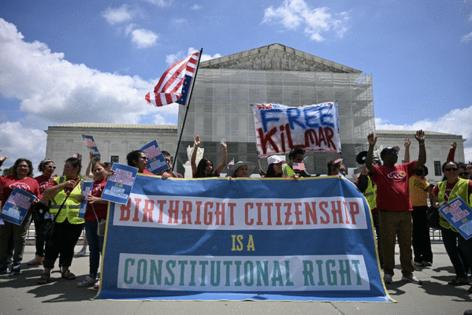Justices skeptical of Trump plan to limit birthright citizenship and judges who blocked it
Published in Political News
WASHINGTON — The Supreme Court gave a skeptical hearing Thursday to a lawyer for President Donald Trump who was appealing rulings that blocked his plan to deny citizenship to newborns whose parents were in this country illegally or temporarily.
None of the justices spoke in favor of Trump's plan to restrict birthright citizenship, and several were openly skeptical.
"Every court is ruling against you," said Justice Elena Kagan. "There's not going to be a lot of disagreement on this."
If his plan were to take effect, "thousands of children will be born and rendered stateless," said Justice Sonia Sotomayor.
But Thursday's hearing was devoted to a procedural question raised by the administration: Can a single federal judge issue a nationwide order to block the president's plan?
Shortly after Trump issued his executive order to limit birthright citizenship, federal judges in Maryland, Massachusetts and Washington state declared it unconstitutional and blocked its enforcement nationwide.
In response, Trump's lawyers asked the court to rein in the "epidemic" of nationwide orders handed by district judges.
It's an issue that has divided the court and bedeviled both Democratic and Republican administrations.
Trump's lawyers argued that on procedural grounds the judges overstepped their authority. But it is also procedurally unusual for a president to try to revise the Constitution through an executive order.
Thursday's hearing did not appear to yield a consensus on what to do.
Justice Brett M. Kavanaugh said the plaintiffs should be required to bring a class-action claim if they want to win a broad ruling. But others said that would lead to delays and not solve the problem.
Justice Neil M. Gorsuch said he was looking for a way to decide quickly. "How we get to the merits expeditiously?" he asked.
One possibility was to have the court ask for further briefing and perhaps a second hearing to decide the fundamental question: Can Trump acting on his own revise the long-standing interpretation of the 14th Amendment?
Shortly after the Civil War, the Reconstruction Congress wrote the 14th Amendment, which begins with the words: "All persons born or naturalized in the United States and subject to the jurisdiction thereof are citizens of the United States and of the state wherein they reside."
Prior to that time, Americans were citizens of their states. Moreover, the Supreme Court in the infamous Dred Scott decision said Black people were not citizens of their states and could not become citizens even if they were living in a free state.
The amended Constitution established U.S. citizenship as a birthright. The only persons not "subject to the jurisdiction" of the laws of the United States were foreign diplomats and their families and, in the 19th century, Indians who were "not taxed" and were treated as citizens of their tribal nations.
However, Congress changed that rule in 1924 and extended birthright citizenship to Native Americans.
Since 1898, the Supreme Court has agreed that birthright citizenship extended to the native-born children of foreign migrants living in this country. The court said then "the fundamental rule of citizenship by birth, notwithstanding the alienage of parents" had been established by law.
The decision affirmed the citizenship of Wong Kim Ark, who was born in San Francisco in 1873 to Chinese parents who were living and working there, but who were not U.S. citizens.
But several conservative law professors have disputed the notion that the phrase "subject to the jurisdiction" of the United States means simply that people living here are subject to the laws here.
Instead, they say it refers more narrowly to people who owe their undivided allegiance to this country. If so, they contend it does not extend broadly to illegal immigrants or to students and tourists who are here temporarily.
On Jan. 20, Trump issued an executive order proclaiming the 14th Amendment does not "extend citizenship universally to everyone born within the United States." He said it would be U.S. policy to not recognize citizenship for newborns if the child's mother or father was "not a United States citizen or lawful permanent resident at the time of said person's birth."
Immigrants rights groups sued on behalf of several pregnant women, and they were joined by 22 states and several cities.
Judges wasted no time in declaring Trump's order unconstitutional. They said his proposed restrictions violated the federal law and Supreme Court precedent as well as the plain words of the 14th Amendment.
In mid-March, Trump's lawyers sent an emergency appeal to the Supreme Court with "a modest request." Rather than decide the "important constitutional questions" involving birthright citizenship, they urged the justices to rein in the practice of district judges handing down nationwide orders.
They have "reached epidemic proportions since the start of the current administration," they said.
A month later, and without further explanation, the court agreed to hear arguments based on that request.
The justices are likely to hand down a decision in Trump vs. CASA, but it may not come until late June.
_____
©2025 Los Angeles Times. Visit latimes.com. Distributed by Tribune Content Agency, LLC.



























































Comments